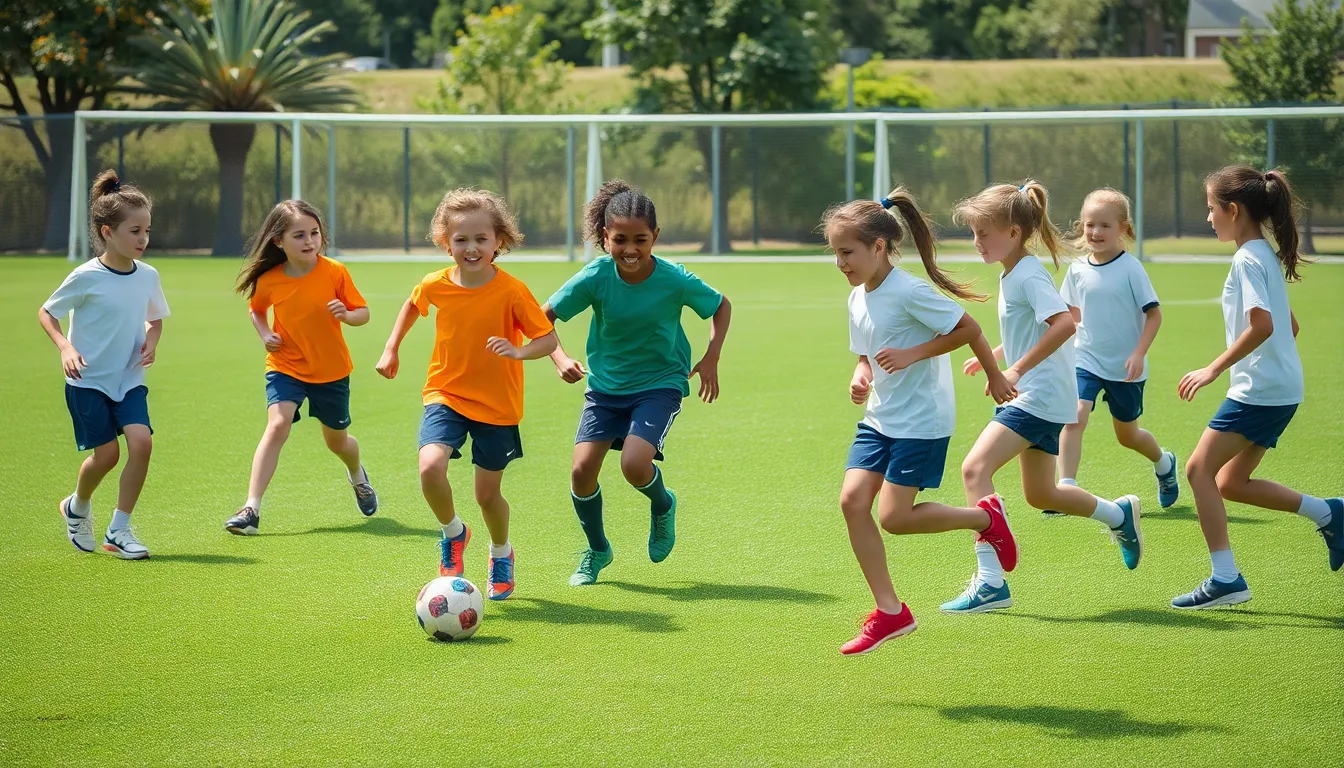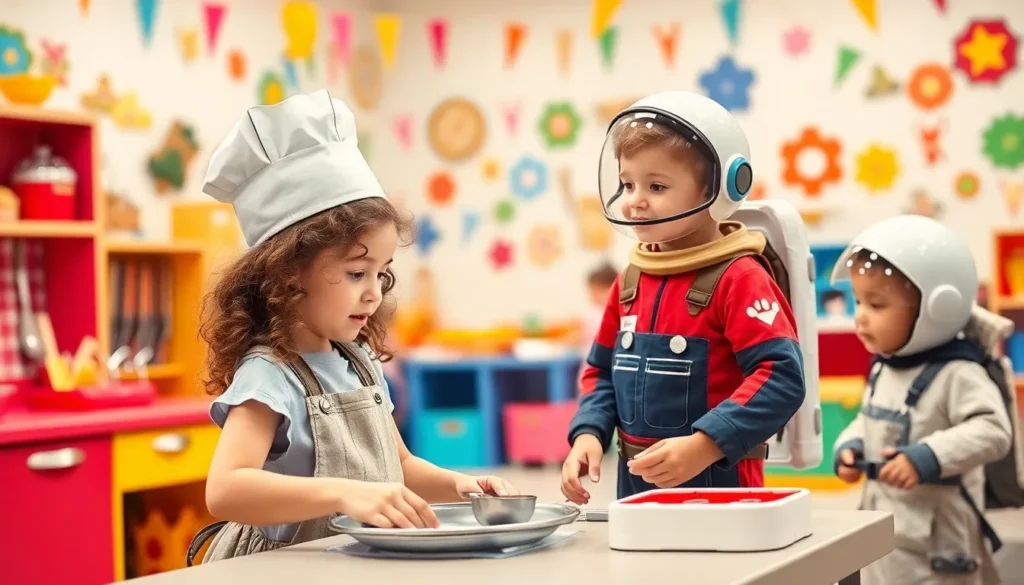Table of Contents
ToggleJunior sports teams are where future athletes kick off their journey, and let’s be honest, they’re also where parents discover the true meaning of teamwork—especially when it comes to carpooling and snack duty. These teams don’t just teach kids how to dribble a ball or swing a bat; they instill life skills that go beyond the field. From learning how to lose gracefully to celebrating those hard-earned victories, junior sports are a rite of passage that shapes character.
Imagine a world where kids develop friendships while perfecting their skills and parents bond over the latest game-day gossip. It’s a whirlwind of fun, laughter, and the occasional lost shoe. So, whether your child dreams of being the next sports superstar or just wants to hang out with friends, junior sports teams offer a playground of opportunities that can’t be missed.
Overview of Junior Sports Teams
Junior sports teams play a critical role in youth development. These teams introduce children to various sports, laying the groundwork for physical fitness and athletic skills. Coaches often emphasize the importance of teamwork, encouraging young athletes to work together toward common goals.
Participation in junior sports teams facilitates character development. Players learn resilience through challenges and setbacks, which reinforces their ability to cope with adversity. Skills like discipline, commitment, and responsibility are essential both on and off the field.
Social benefits accompany athletic involvement. Children form friendships that often extend beyond sports, creating a sense of community and support. Parents frequently bond over shared experiences, strengthening family ties and fostering a vibrant social network.
Many associations and organizations oversee these teams. Their structured programs ensure safety and promote a positive sporting environment. Engagement in junior sports not only enhances physical health but also nurtures emotional and social well-being.
Data shows that children involved in organized sports exhibit improved confidence levels. Statistics indicate a correlation between participation in junior sports and academic performance, highlighting the multifaceted benefits of these programs. Furthermore, the positive experiences from these teams contribute to lifelong appreciation for physical activity.
Understanding the significant impact of junior sports teams helps communities prioritize youth sports initiatives. Communities benefit from investing in programs that promote healthy lifestyles while supporting child development.
Importance of Junior Sports Teams

Junior sports teams play a crucial role in the development of young athletes. They provide more than just physical training, offering valuable lessons that extend beyond the field or court.
Physical Development
Junior sports teams facilitate substantial physical development in children. Active participation boosts cardiovascular fitness and muscular strength. Evidence points to improved coordination, balance, and flexibility due to regular practice and play. Children engage in various physical activities, which helps combat childhood obesity. Consistent involvement in sports also establishes lifelong habits of activity and fitness. Programs often include skill-building exercises that enhance performance and reduce injury risk.
Social Skills Development
Junior sports teams significantly enhance social skills among participants. Team environments foster communication, cooperation, and leadership. Players learn to work together towards common goals, cultivating trust and responsibility. Regular interactions create friendships that often extend beyond the game, contributing to social development. Shared experiences encourage inclusivity and respect for diversity in a team setting. Moreover, participation provides opportunities for conflict resolution and peer support. Through these experiences, young athletes build a sense of community that supports their overall well-being.
Types of Junior Sports Teams
Junior sports teams can be categorized into two primary types: team sports and individual sports. Each type plays a unique role in developing young athletes.
Team Sports
Team sports involve groups of players working together towards a common objective. Children develop critical skills such as teamwork and cooperation while engaging in sports like soccer, basketball, and baseball. These sports require effective communication and collaboration, reinforcing social interactions. The camaraderie built on these teams encourages friendships that last beyond the game. Players experience shared goals and successes, which boosts confidence and fosters a sense of belonging.
Individual Sports
Individual sports allow young athletes to focus on personal performance and self-improvement. Sports such as swimming, gymnastics, and tennis enable children to cultivate discipline and responsibility. Participants learn how to set personal goals and develop a strong work ethic. The solo nature of these sports also enhances self-reliance, as young athletes face challenges independently. Competing against oneself promotes a growth mindset, essential for long-term success. Overall, these sports contribute to emotional resilience and individual character development.
Benefits of Participation in Junior Sports Teams
Engaging in junior sports teams offers numerous advantages that contribute to both physical and personal development. Participation fosters essential health benefits alongside the acquisition of vital life skills.
Health Benefits
Improved cardiovascular fitness emerges as a primary benefit of involvement in junior sports. Regular activity enhances muscular strength, coordination, balance, and flexibility. Engaging in sports also plays a critical role in combating childhood obesity, promoting healthier lifestyles among youth. Data shows that active children exhibit higher levels of energy and stamina, which support both physical and mental health. Significant improvements in overall fitness dramatically impact emotional well-being, as children experience increased confidence tied to their physical capabilities. Structured sports programs teach kids the importance of maintaining an active lifestyle, establishing healthy habits that extend into adulthood.
Life Skills Acquired
Participation in junior sports cultivates invaluable life skills critical for future success. Teamwork and cooperation become second nature as players learn to work towards common objectives. Problem-solving skills evolve through game strategy and overcoming challenges. Communication skills develop naturally, fostering positive interactions with teammates and coaches alike. Emotional resilience strengthens as children navigate wins and losses, leading to improved self-esteem and tenacity. Responsibility and discipline emerge from the commitment to practice and teamwork. Friendships formed in these settings often endure beyond youth, creating lasting bonds that enhance social capabilities and foster a sense of community.
Challenges Faced by Junior Sports Teams
Junior sports teams encounter various challenges that can impact their effectiveness and sustainability. These obstacles can hinder the development of young athletes and their overall experience.
Funding and Resources
Funding plays a crucial role in the success of junior sports teams. Many organizations struggle to secure adequate financial support, limiting access to essential resources such as equipment, facilities, and training programs. Insufficient funding may lead to higher participation fees, making it difficult for families with lower incomes to enroll their children. Community outreach and fundraising initiatives often help bridge this gap, yet they require significant time and effort to implement. Teams that prioritize donor relationships and sponsor involvement typically see improved funding levels, which directly benefits their athletes.
Coaching Quality
Coaching quality significantly influences the development of young athletes. Many teams depend on volunteer coaches, who may lack formal training or experience. Limited resources often restrict access to coaching clinics and professional development opportunities, which further affects coaching effectiveness. Teams with a strong emphasis on coach education tend to foster better performance and athlete retention. Player feedback plays an essential role in enhancing coaching methods and strategies. Continuous improvement in coaching practices ensures that young athletes receive the guidance necessary to thrive in their sports.
Junior sports teams play a crucial role in the growth and development of young athletes. They offer a platform for children to learn essential life skills while promoting physical fitness and emotional well-being. The friendships and sense of community forged through these teams create a supportive environment that extends beyond the playing field.
Despite the challenges faced by junior sports teams, such as funding and coaching quality, the benefits of participation are undeniable. By prioritizing youth sports initiatives, communities can ensure that children have access to valuable experiences that shape their character and foster lifelong habits of activity. Investing in junior sports not only enhances individual lives but also strengthens community bonds, paving the way for a healthier future.










